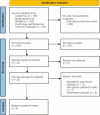A rapid literature review on the health-related outcomes of long-term person-centered care models in adults with chronic illness
- PMID: 37670836
- PMCID: PMC10477001
- DOI: 10.3389/fpubh.2023.1213816
A rapid literature review on the health-related outcomes of long-term person-centered care models in adults with chronic illness
Abstract
Introduction: The strong association between age and the increasing prevalence of chronic diseases, makes it imperative to promote self-care throughout life. Systematic knowledge on the health findings of person-centered care models may contribute to designing effective healthcare strategies to promote empowerment for self-care in long-term care.
Objective: To assess the association between the implementation of person-centered care models that promote self-care training in long-term care and health-related outcomes, among adults with chronic illness.
Methods: A rapid review of the literature was performed following the Cochrane rapid review methodology. The electronic databases CINAHL, MedicLatina, MEDLINE, and Psychology and Behavioral Sciences Collection were searched for randomized experimental studies, published between 2017 and 2022, that implemented interventions based on person-centered models to promote self-care in adults aged ≥18 years with chronic diseases and needing long-term health care. Verification of the eligibility of the articles and the extraction of data were performed by two independent investigators. Quantitative data on the health-related variables assessed were collected and, through narrative synthesis, health outcomes were grouped into individual, institutional and societal levels.
Results: Eight studies, mostly conducted in European countries, were included. All satisfied more than 60% of the methodological quality score. A large variability among studies was found regarding the number of participants, the data collection period and duration of the intervention, the samples selected and the care model implemented. A high number of health-related outcomes (n = 17) were analyzed in the studies, using 52 different instruments. The main health-related outcomes were multidimensional, with implications at the individual, institutional and societal levels. The promotion of overall health and wellbeing (n = 4), the implementation of patient-centered care models (n = 1), the positive and more frequent interactions with health professionals (2), the decrease on staff psychosocial distress (n = 1), and the absence of added costs (n = 1), while improving family caregivers' skills (n = 1) were the main health-related outcomes described.
Conclusion: There is a need to develop robust experimental studies focused on the views and experiences of all stakeholders and conducted in different countries and cultures. Short-, medium- and long-term health outcomes should be measured using internationally accepted and validated scales for chronic patients.
Keywords: aging; health-related outcomes; long-term care; patient-centered care; self care.
Copyright © 2023 Cano, Alves, João, Oliveira, Pinho and Fonseca.
Conflict of interest statement
The authors declare that the research was conducted in the absence of any commercial or financial relationships that could be construed as a potential conflict of interest.
Figures
Similar articles
-
Programmes Addressed to Informal Caregivers' Needs: A Systematic Literature Review.Geriatrics (Basel). 2024 May 30;9(3):71. doi: 10.3390/geriatrics9030071. Geriatrics (Basel). 2024. PMID: 38920427 Free PMC article. Review.
-
Beyond the black stump: rapid reviews of health research issues affecting regional, rural and remote Australia.Med J Aust. 2020 Dec;213 Suppl 11:S3-S32.e1. doi: 10.5694/mja2.50881. Med J Aust. 2020. PMID: 33314144
-
Promoting and supporting self-management for adults living in the community with physical chronic illness: A systematic review of the effectiveness and meaningfulness of the patient-practitioner encounter.JBI Libr Syst Rev. 2009;7(13):492-582. doi: 10.11124/01938924-200907130-00001. JBI Libr Syst Rev. 2009. PMID: 27819974
-
The future of Cochrane Neonatal.Early Hum Dev. 2020 Nov;150:105191. doi: 10.1016/j.earlhumdev.2020.105191. Epub 2020 Sep 12. Early Hum Dev. 2020. PMID: 33036834
-
Resident outcomes of person-centered care in long-term care: a narrative review of interventional research.Int J Nurs Stud. 2014 Oct;51(10):1395-415. doi: 10.1016/j.ijnurstu.2014.04.003. Epub 2014 Apr 18. Int J Nurs Stud. 2014. PMID: 24815772 Review.
Cited by
-
Testing the TEC-MED-Integrated Transcultural Social-Ethical-Care Model for Older People in the Mediterranean Basin: A Mixed-Method Quasiexperimental Study Protocol.Int J Integr Care. 2025 May 9;25(2):9. doi: 10.5334/ijic.9017. eCollection 2025 Apr-Jun. Int J Integr Care. 2025. PMID: 40352956 Free PMC article.
-
Fragmented care in lupus: Patient experiences and insights.Afr J Disabil. 2025 Jan 28;14:1562. doi: 10.4102/ajod.v14i0.1562. eCollection 2025. Afr J Disabil. 2025. PMID: 39968381 Free PMC article.
-
Programmes Addressed to Informal Caregivers' Needs: A Systematic Literature Review.Geriatrics (Basel). 2024 May 30;9(3):71. doi: 10.3390/geriatrics9030071. Geriatrics (Basel). 2024. PMID: 38920427 Free PMC article. Review.
-
Person-Centred Care: A Support Strategy for Managing Non-Communicable Diseases.Healthcare (Basel). 2024 Feb 23;12(5):526. doi: 10.3390/healthcare12050526. Healthcare (Basel). 2024. PMID: 38470637 Free PMC article.
-
A Bibliometric Review of Person-Centered Care Research 2010-2024.Healthcare (Basel). 2025 May 27;13(11):1267. doi: 10.3390/healthcare13111267. Healthcare (Basel). 2025. PMID: 40508880 Free PMC article. Review.
References
-
- Fonseca C, Lopes MJ. Functional deficit and sensitive outcomes to nursing care for elderly: systematic literature review. J Nurs Socioenviron Health. (2014, 2014) 1:213–20. doi: 10.15696/2358-9884/jonse.v1n2p213-220 - DOI
-
- Lopes M. Challenges and Innovation in Health: Rethinking Care Models Imprensa da Universidade de Évora; (2021).
Publication types
MeSH terms
LinkOut - more resources
Full Text Sources



